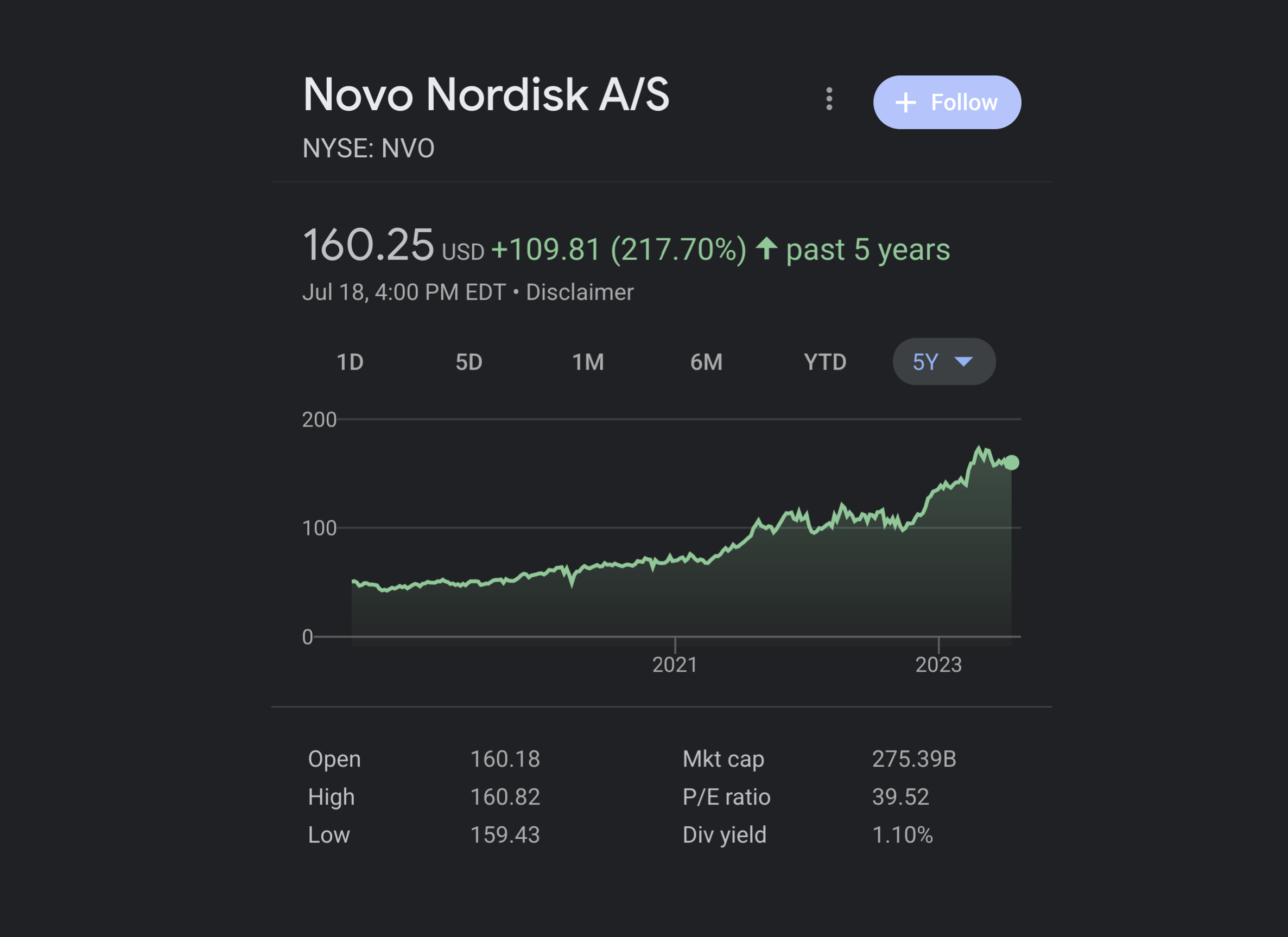In February of 2021, my friend Alyssa Vance suggested buying stock in Novo Nordisk, the makers of semaglutide. At the time, the STEP1 trial had just demonstrated that a weekly 2.4 mg injection of semaglutide was responsible for a mean weight reduction of -14.9%, compared to -2.4% in the control group. At n = 1,961, this trial was powerful enough to make its point beyond a shadow of a doubt, and the results are among the most impressive I’ve ever seen.
Despite this, I advised not investing in NVO. Almost two and a half years later, this comment has proven to be… unfelicitous.

I did not attach a probability to this prediction, and therefore cannot deduct Bayes points with much accuracy. To my shame, my Brier score will not reflect this failure. In lieu of quantitative penance I can say that I thought the most likely outcome was bullish for Novo Nordisk, but not enough to warrant investing in them specifically. In all likelihood the gains from semaglutide’s approval for treating weight loss were already priced in and unlikely to beat the market by much, I reasoned, and the risk of acute pancreatitis or thyroid cancer giving the FDA pause the way cancer did for lorcaserin was high enough to wait and see.
This prediction bore out until the end of 2022. Annual sales of semaglutide reached $8.5 billion US, and the forecast for 2023 is $12.5 billion. My 2021 prediction noted that Lipitor, the best selling drug of all time, had peak annual sales of $13 billion. Wegovy (the brand name of semaglutide sold for weight loss) is unlikely to take the record for highest revenue for a single drug, a title which AbbVie’s arthritis drug Humira recently took with $214 billion since 2003, but the enormous demand for reliable weight loss medication and the lack of competitors or generics on the horizon means Wegovy is set to rake in cash for the foreseeable future.
I was clearly wrong.
Key Takeaways
My focus as a biotech investor has historically been short positions. The pharmaceutical industry is rife with small companies aiming to demonstrate efficacy in just one or two drugs, and oftentimes their investors seem to disagree with the available evidence. Pre-catalyst prices usually reflect a reasonable probability of success or failure with the FDA, but occasionally the phase II data will be scuffed (post hoc analysis with inadequate correction is common, p-value hacking happens occasionally, outright fraud is rare) and it becomes worthwhile to think about betting against the market.
I have no specialized knowledge of long investments. My portfolio consists mostly of Vanguard ETFs, which seems to be among the cheapest ways of ensuring that my retirement savings rise and fall with the fortunes of the S&P 500. A precipitous decline in corporate equity forces companies like these to service their debt in predictable ways. In contrast, I know very little about how the market cap or P/E ratio are likely to respond to unusually good news. I prefer to avoid gambling without that kind of edge.
Apart from that, in retrospect it seems obvious that the billions of overweight people on Earth would push Wegovy sales into the stratosphere. Weight loss is generally considered desirable[citation needed] and it’s hard to accomplish durable weight loss without medical intervention. Healthcare systems are enthusiastic about paying for semaglutide, because it’s cheaper in expectation than bariatric surgery or dealing with complications from obesity later in life, and Novo Nordisk is equally enthusiastic about selling it. It’s a recipe for success, no doubt about it.
I didn’t know enough about semaglutide to confidently add it to my portfolio – and still don’t, if I’m being honest. It takes a lot of confidence to defy the efficient market hypothesis. I’ll forgive myself for not investing in Novo Nordisk, but not for ignoring the signs that I should’ve investigated further. I’ll try to do better next time!